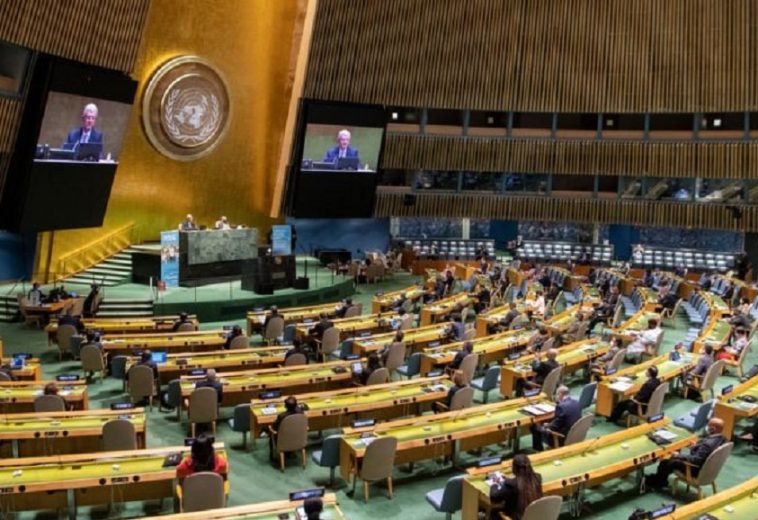On UN World Maritime Day, the international maritime community reflects on the industry’s vital role in global trade, economic growth, and environmental sustainability. This year’s theme, “Navigating the Future: Safety First!”, underscores the importance of prioritising safety while promoting sustainable practices in the ever-evolving maritime sector. As Arsenio Dominguez, Secretary-General of the International Maritime Organisation (IMO), emphasised, “Our primary focus must remain on ensuring the safety and security of our seafarers, who are the backbone of global trade.”
Africa’s Strategic Role in Global Maritime Trade
Africa, with its extensive coastline and increasing influence in maritime trade, plays a crucial role in global efforts to enhance safety and sustainability. As Dominguez noted, “Africa’s maritime potential is immense, and its role in shaping a sustainable future for shipping cannot be overstated.”
The continent’s coastline, spanning over 30,000 kilometres and bordering both the Atlantic and Indian Oceans, positions Africa at a strategic crossroads in global maritime trade. Key shipping routes, including those passing through the Suez Canal and around the Cape of Good Hope, handle a significant portion of the world’s maritime cargo, making African nations vital players in global shipping networks. Furthermore, 38 of Africa’s 54 countries have coastlines, highlighting the maritime sector’s importance for economic development, job creation, and trade across the continent.
According to the United Nations Conference on Trade and Development (UNCTAD), Africa accounts for over 5% of global maritime trade, a figure expected to rise as the continent continues to develop its resources, ports, and infrastructure. Leading maritime economies such as Egypt, South Africa, Nigeria, Kenya, and Morocco are driving regional growth by modernising ports, enhancing logistics, and investing in maritime infrastructure. Egypt, for example, handles a significant share of global maritime cargo through the Suez Canal, one of the world’s most crucial trade routes.
The African Continental Free Trade Area (AfCFTA), launched in 2021, aims to boost intra-continental trade by over 50% through maritime routes, transforming Africa into a major global trade hub and enhancing connectivity between African ports, thus strengthening its integration into the global economy.
Maritime Safety and Security Challenges
Africa’s maritime industry faces significant safety and security challenges, particularly in the Gulf of Guinea, where piracy, illegal fishing, and unregulated activities are prevalent. The Yaoundé Code of Conduct, signed by 25 West and Central African countries in 2013, seeks to enhance regional cooperation on maritime security. Regional organisations like the Intergovernmental Authority on Development (IGAD) and the African Union are also promoting maritime security and collaboration.
However, inadequate safety standards in some African ports increase the risk of accidents and undermine maritime trade efficiency. To safeguard maritime workers and the environment, African nations are working to strengthen regulatory frameworks, improve port safety, and train personnel to elevate safety standards across the industry.
Sustainable Ocean Practices: A Shared Global Responsibility
While Africa’s maritime industry holds great potential for economic growth, it also has a significant responsibility in ensuring the sustainability of the world’s oceans. The theme of this year’s World Maritime Day, “Safety First,” resonates deeply with the global mission of preserving ocean health. As home to some of the world’s richest marine biodiversity, Africa’s oceans are essential not only for trade but also for the livelihoods of millions who rely on fisheries and other marine resources.
Overfishing and illegal fishing pose severe threats to Africa’s marine ecosystems, with over 30% of the world’s fish stocks overexploited. Coastal communities, particularly in West Africa, are acutely affected by the depletion of fish stocks, jeopardising food security and economic stability. In response, African governments and international organisations are working to establish stricter regulations and enforce measures to combat illegal, unreported, and unregulated (IUU) fishing.
The Blue Economy concept is gaining traction in Africa as a sustainable development model, focusing on the protection of marine resources while promoting economic growth through ocean-based industries such as fisheries, tourism, and renewable energy. Kenya hosted the Sustainable Blue Economy Conference in 2018, while South Africa and Seychelles are leading efforts to implement national policies that balance environmental protection with economic opportunities.
African Maritime Innovation and Future Prospects
The maritime industry is rapidly evolving, with technological innovations transforming shipping, logistics, and management. Africa’s integration into this new era depends on its ability to adopt new technologies and enhance its maritime capabilities. The digitalisation of ports, automation, and smart shipping technologies are key developments shaping the future of maritime trade globally. Ports such as Durban, Tanger-Med, and Mombasa are at the forefront of adopting these technologies to improve efficiency, reduce costs, and enhance safety.
Additionally, green technologies are being embraced to reduce the maritime industry’s impact on climate change and contribute to global environmental goals. African nations are investing in capacity building to improve skills and expertise within the maritime sector, with organisations like the African Union and African Maritime Technology Cooperation Centres providing training and technical assistance.
READ ALSO: The Untouched Natural Wonders of Equatorial Guinea’s Bioko Island
Charting a Safe and Sustainable Future
As we observe UN World Maritime Day with the theme “Navigating the Future: Safety First!”, it is evident that Africa has a crucial role in shaping the future of global maritime trade and ensuring the sustainability of the world’s oceans. The continent’s strategic location, abundant resources, and growing economic influence present significant opportunities for expanding its maritime industry and contributing to global trade.
However, challenges remain in ensuring maritime safety, addressing environmental threats, and embracing technological advancements. African nations must continue to strengthen security frameworks, adopt sustainable ocean practices, and invest in innovation and capacity building. By doing so, Africa can safeguard its maritime future while contributing meaningfully to global efforts to protect our oceans and promote safer, more sustainable trade practices.
As the world navigates the future of maritime trade, with a strong emphasis on safety, sustainability, and innovation, Africa stands poised at the forefront of this transformative journey, ready to harness its potential and drive positive change in the global maritime landscape.




